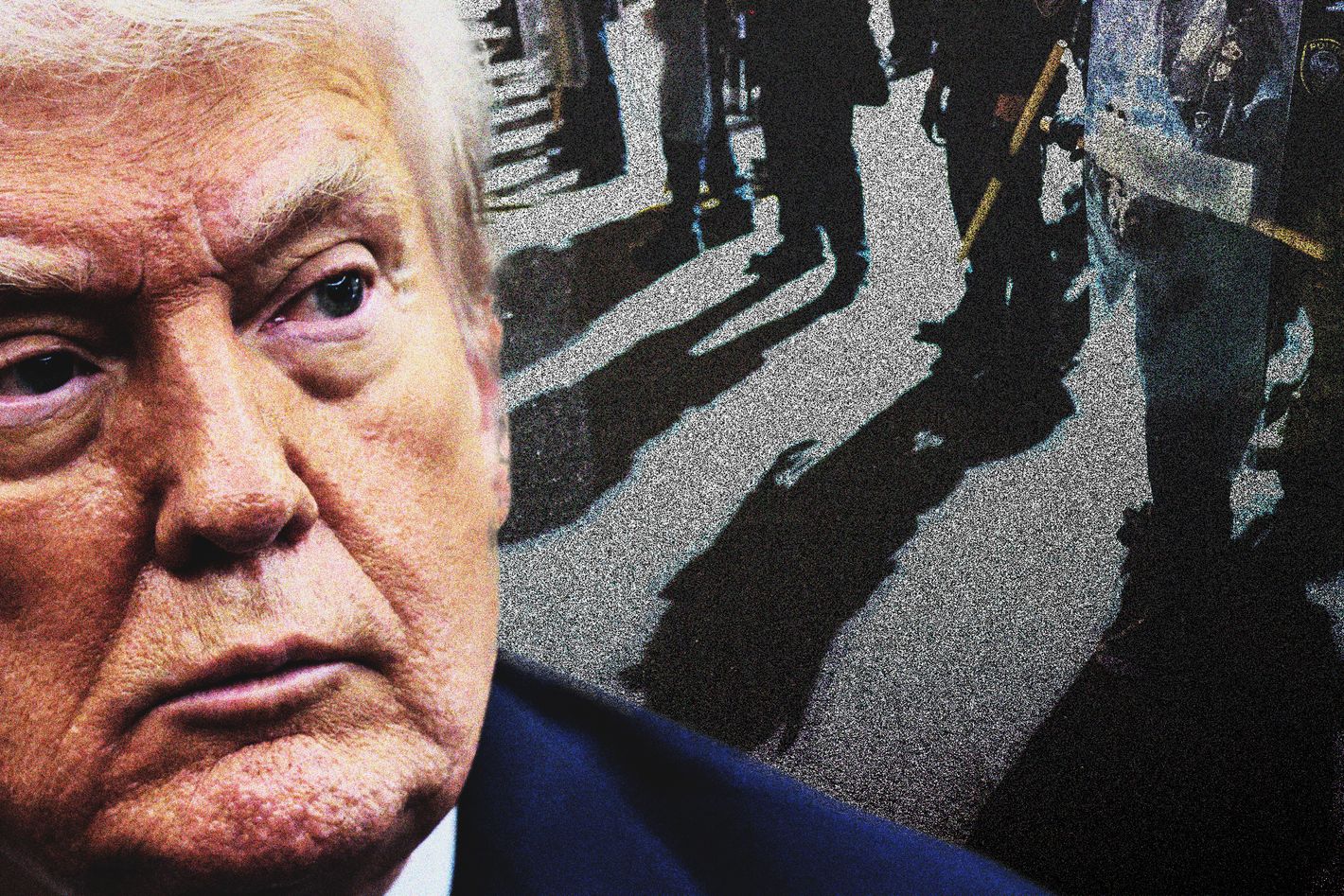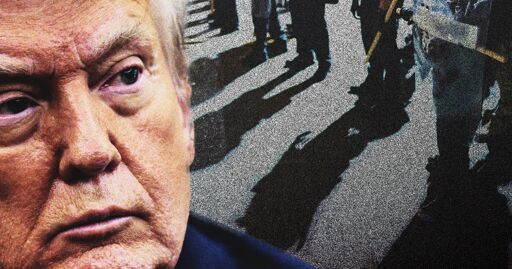
Photo-Illustration: Intelligencer; Photos: Getty
In constitutional law, animus is defined as ill will toward a group of people for discriminatory, illegitimate reasons — because they’re Black, women, born in another country, queer, or belong to an unpopular group. One through-line in Donald Trump’s style of governance over the years has been animus. His Muslim travel ban, his decision to expel transgender servicemembers from the military, and his administration’s crackdown on so-called gender ideology and diversity, equity, and inclusion initiatives, to name a few areas, are all expressions of animus toward people, groups, even ideas, which the law can and should protect but the president has seen fit to crush or banish.
The animus in Trump’s decision to federalize the Illinois National Guard, like his decision to federalize the California National Guard and the Oregon National Guard, is different in kind. These decisions are driven by his hostility toward major U.S. cities led by Democrats, where his policies and politics aren’t welcome. Under the pretext of desiring to maintain law and order, the president is targeting states that are separate sovereigns because their governors, elected leaders, and residents simply reject the idea that federal agents should be allowed to roam the streets like an occupying force, snatching and disappearing their own — workers, bystanders, and others simply going about their lives or looking a certain way. Might a judge find this type of animus violates the Constitution?
“The federalization and deployment of the National Guard in the Chicago area is the direct result of President Trump’s longstanding and well-documented animus toward Illinois and Chicago,” reads a legal memorandum in support of the Illinois lawsuit now pending before a federal judge challenging the legality of this latest gambit. As the state’s federal complaint documents, Trump’s personal animus and his administration’s actions against Illinois and Chicago run deep. In a number of cases in recent months, judges have begun to take notice, dismissing or striking down federal attempts to single out, defund, or invalidate programs and policies Illinois has adopted to advance its own vision of public safety and the general welfare of its residents.
Things took a darker turn last week, when the president made his animus plain in front of an audience of U.S. military leaders, telling them that Chicago and other cities must serve as “training grounds for our military” in what he called a “war from within.” In all these bellicose actions and musings, including Trump’s suggestion on Wednesday that Illinois governor J.B. Pritzker and Chicago mayor Brandon Johnson should be imprisoned, the Trump administration is waging a war with the very idea of Democratic, and democratic, governance of any kind. Troops or no troops on the ground, if you live anywhere that didn’t vote for Trump or where voters proactively support politicians and policies that oppose him, your comeuppance is near. “We’re going to straighten them out one by one,” said the commander in chief at his gathering of generals.
At the heart of this open clash between the federal government and a state government is the Tenth Amendment, which gives states their own police power over local law enforcement — to the exclusion of the president’s own, which remains confined to federal agencies with limited law-enforcement authority, such as Immigration and Customs Enforcement. Federalizing other states’ National Guards is, in effect, a constitutional end run to establishing, as a judge in California put it last month, “a national police force with the President as its chief” — not a thing in the United States.
U.S. District Judge Karin Immergut, the Trump appointee in Oregon who quickly blocked his attempt to federalize the guard there and later blocked Texas’s and California’s troops from setting foot in the state, echoed these principles when she explained that the legal issues implicated in these unlawful deployments are foundational to our constitutional democracy. Among these issues is the allocation of power between the federal government and Oregon’s “right,” under the Tenth Amendment, to control its own National Guard. Doing away with this arrangement, she suggested, would be akin to doing away with these United States as we know them. “This encroachment on Oregon’s police power leaves an indelible mark on Oregon’s ‘sovereignty under the Constitution’ … which cannot be remedied by a ‘legal remedy, such as an award of damages,’” she wrote.
Judge Immergut’s ruling, which the Justice Department is appealing and the U.S. Court of Appeals for the Ninth Circuit will review on Thursday, should be mandatory reading for its clear-eyed assessment of how a judge, closest to the facts in her own backyard, should be ready and willing to see right through Trump’s animus and second-guess his pretext. Under recent case law from the Ninth Circuit created during Trump’s deployment of the California National Guard in Los Angeles, a judge must afford “a great level of deference” to a president calling forth the guard under federal law, such as when he determines he “is unable with the regular forces to execute the laws of the United States.” Yet great deference under the law doesn’t mean being blind to the reality in Portland, which is a “war zone” only in Trump’s imagination. As Immergut observed, “The President’s determination was simply untethered to the facts.” (The Ninth Circuit briefly paused part of her ruling while the judges there consider it; the Oregon guard remains federalized but not deployed.)
With the benefit of Immergut’s reasoning and the president’s own show of bad faith, Illinois will make its case to a federal judge on Thursday that the federalization of the Illinois guard, and what Pritzker has called an “invasion” from the Texas National Guard, violates federal law and the Tenth Amendment. Key to the state’s case is the president’s trail of animus and the absence of any evidence to support a determination that he cannot enforce the law. Lawyers for the state wrote in a legal filing that even if the court considers other reasons given by Trump, such as Chicago being a “hotbed of crime,” they do not satisfy the law that grants Trump the authority to nationalize the guard only if he finds there’s a rebellion or an invasion or he is disempowered from enforcing the law “with the regular forces.”
Indeed, the pair of orders Defense secretary Pete Hegseth sent to Illinois and Texas calling their guards to federal service make only passing reference to the need to provide support for ICE functions and protect federal property, referring to “the credible threat of continued violence” but not much else. Illinois contends that’s not enough to trigger the statute: “Protests, civil disobedience, or sporadic unlawful acts by a handful of individuals within an otherwise peaceful crowd do not come remotely close to that threshold.” (In a telling aside in the Portland case, Immergut suggested that mobilizing the guard in Los Angeles “inflamed protests, spawned unrest at new locations, and required additional resources from the California Highway Patrol.” As in, the president compounded the crisis that was of his own making.)
But perhaps there’s an even simpler way to keep a national police force out of the president’s reach. Mark Graber, a legal historian at the University of Maryland who has written extensively about the relationship between the president and state militias, filed amicus briefs in the Portland and Los Angeles cases explaining that the law allowing for the federalization of the National Guard may be invoked “only in response to a war or warlike conditions” and that judges are perfectly capable of assessing these “objective” criteria. As Graber sees it, Congress wrote the law to “curtail presidential discretion” and thus judges should give zero deference to a president wishing to deploy the military domestically. And as I read Graber’s survey of the law and the history, things have to get quite dire, down to the point of anarchy, for a state deployment to be lawful. “The upshot is this: history, judicial precedent, and our founding principles teach that a president cannot demonstrate an inability to execute the laws,” Graber writes, “unless federal courts and the civil power are inoperative.”
Should the judge in Illinois embrace that analysis, which goes beyond what the Ninth Circuit concluded for Los Angeles and Immergut did for Portland, then our federalist system may yet survive the president’s naked desire to upend it. And his animus toward Democratic and democratic governance in cities and states that don’t fall in line, in support of a national police force that the Constitution and laws don’t allow, may yet be reduced to Truth Social rants with no force of law.
From Intelligencer - Daily News, Politics, Business, and Tech via this RSS feed

